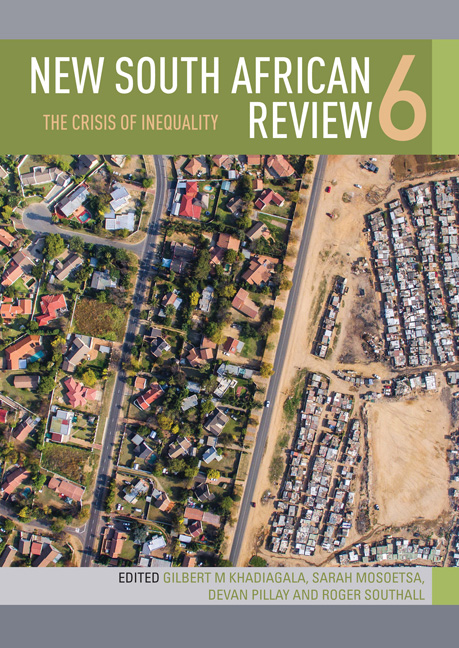Book contents
- Frontmatter
- Contents
- List of tables and figures
- INTRODUCTION: The global crisis of inequality and its South African manifestations
- PART 1 INEQUALITY AND CLASS: POLARITIES AND POLICIES
- PART 2 THE POLITICS OF INEQUALITY
- PART 3 SOCIAL DIMENSIONS OF INEQUALITY
- CHAPTER 8 Analysis must rise: A political economy of falling fees
- CHAPTER 9 Education, the state and class inequality: The case for free higher education in South Africa
- CHAPTER 10 Still waiting: The South African government's pending promise of equality for people with disabilities
- CHAPTER 11 Big fish in small ponds: Changing stratification and inequalities in small towns in the Karoo region, South Africa
- PART 4 LAND AND ENVIRONMENT
- Contributors
- Index
CHAPTER 9 - Education, the state and class inequality: The case for free higher education in South Africa
from PART 3 - SOCIAL DIMENSIONS OF INEQUALITY
Published online by Cambridge University Press: 23 March 2018
- Frontmatter
- Contents
- List of tables and figures
- INTRODUCTION: The global crisis of inequality and its South African manifestations
- PART 1 INEQUALITY AND CLASS: POLARITIES AND POLICIES
- PART 2 THE POLITICS OF INEQUALITY
- PART 3 SOCIAL DIMENSIONS OF INEQUALITY
- CHAPTER 8 Analysis must rise: A political economy of falling fees
- CHAPTER 9 Education, the state and class inequality: The case for free higher education in South Africa
- CHAPTER 10 Still waiting: The South African government's pending promise of equality for people with disabilities
- CHAPTER 11 Big fish in small ponds: Changing stratification and inequalities in small towns in the Karoo region, South Africa
- PART 4 LAND AND ENVIRONMENT
- Contributors
- Index
Summary
The state of tumult in our universities continued at the end of 2016, despite the announcement by the minister of higher education that the 8 per cent increase in fees demanded by universities would be subsidised by the state. The amendments to the national budget at the end of October did not deal with the fundamental challenges, but referred only to the implications for funding of the no-fee increase and the additional funding allocated to augment the National Student Financial Aid Scheme (NSFAS) to provide for the ‘missing middle’ (RSA 2016). The national budget did not address the key demand for publicly funded education for all – not even fee-free education for the poor. A significant amount of the increase will be provided to the NSFAS. Hart (2016: 1) – distinguished professor at Wits University – reminds us that:
The failure of state funding to keep pace with growing student numbers has generated the cruel arithmetic of steadily increasing fees. Far from providing a solution, NSFAS is a part of a vicious circle through which inadequate government funding drives up fees, necessitating more support for low-income students. Furthermore, this support is by definition inadequate to the extent that increasing the NSFAS comes at the expense of direct funding to universities, and thus pushes up fees even further. It is little wonder, then, that many black university students feel as though they have been handed a poisoned chalice.
For the year 2015–2016, South Africa's state budget for universities, including funding for NSFAS, continued its decline to 0.72 per cent of gross domestic product (GDP) (RSA 2016: 7), considerably below the international average and even less than the continental average despite the growth of student numbers.1 This chronic underfunding of tertiary education and the ongoing protests and police/private security reaction raised the ire of hundreds of academics who staged a national day of action on 7 October 2016. They demanded an increase of at least 1.5 per cent of the GDP towards directly funding tertiary education, pointing out that the government has created a funding crisis at universities. Underfunding, they argued, has also led to a reduction in student and academic support programmes, high lecturer-student ratios and large class sizes – and has negatively affected the quality of education.
- Type
- Chapter
- Information
- New South African Review 6The Crisis of Inequality, pp. 167 - 182Publisher: Wits University PressPrint publication year: 2018



